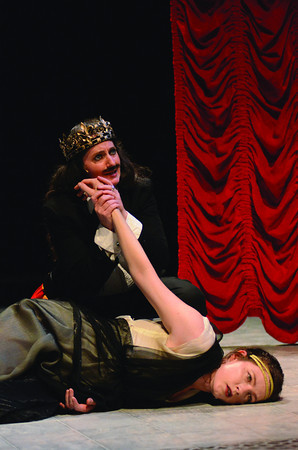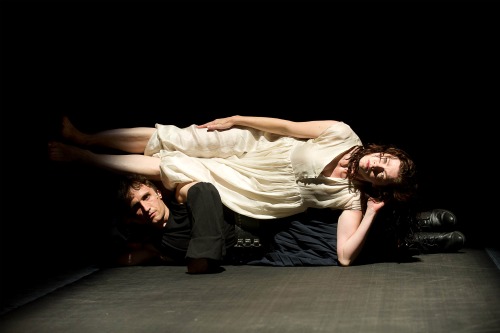To be and not to be. That is a different question. It hovers above Big Dance Theater’s The Supernatural Wife, Annie-B Parson and Paul Lazar’s absorbing re-envisioning of the myth behind Euripedes’ Alkestis. Already seen in Europe and appearing at the Brooklyn Academy of Music’ Next Wave Festival in November, the work’s U.S. premiere took place in Jacob’s Pillow’s Doris Duke Studio Theater from July 27 through 31. As is always the case with Big Dance Theater productions, The Supernatural Wife bounces apparently dissimilar texts and images off one another in surprising and illuminating ways. Remember Plan B (2004), which set Richard Nixon’s private Oval Office tapes and other material against accounts of the attempts to civilize the famous “Wild Child,” Kaspar Hauser, in 19th-century Germany?
The Supernatural Wife weaves fewer disparate strands than previous Parson-Lazar pieces but makes them shine brilliantly and disquietingly. Bits of Euripedes’s text (Anne Carson’s contemporary translation in her Grief Lessons) are preceded by words adapted from the movie His Girl Friday, a comedy in which a reprieve from execution anchors the plot. Classical antiquity and noble words collide with today’s vernacular quirks and media-drenched existence.
The wife in question is Alkestis. For her husband, King Admetus, winning her over many suitors is just one of several boons arranged for him by Apollo, who temporarily served as Ademetus’s herdsman—a punishment imposed by the gods. The final favor forms the crux of Euripedes’ play. Admetus falls ill and wishes he didn’t have to die young. Apollo tricks the Fates to gain a reprieve, but there’s a catch: someone else has to die in Admetus’s stead. Friends, servants, aged parents all refuse him. Not lovely Alkestis. She is now both alive and dead, since there’s no undoing the bargain. Admetus belatedly wishes he could die; without her, he is dead to life.
Herakles arrives at the gate, on his way to one of the twelve labors he has been ordered to perform. Admetus, famed for his hospitality, offers him food and lodging, hiding his grief and the funeral preparations by implying that a foreign visitor has died. Herakles carouses, as is his wont, but is horrified when he discovers the truth. Off he goes to Hades to do battle for Alkestis. Returning with a heavily veiled and silent female, he asks Admetus to keep her for a while, suggesting that maybe a new woman is what the grieving husband needs. The latter has sworn to Alkestis that no one will replace her and he repeats his vow. He has passed Herakles’ test, and Alkestis is restored to him.
Big Dance Theater weaves this heroic drama into something resembling a rehearsal for a version of the play that a group of actors are putting together with the aid of technology that is both up-to-date and slightly ramshackle. Aaron Mattocks, who functions as a blend of stage manager and chorus, makes announcements like “enter Apollo,” but Mattocks’s head appears among a throng of duplicate black-and-white images of himself on a top-quality monitor on the table where he hangs out. Herakles (Pete Simpson) reclines with a beer in front of a vintage tv console. Admetus’s father appears as a talking head (a Greek statue’s angry face with Lazar ‘s voice) on a monitor that’s wheeled in on a wheelchair. A striking filmed image of a hand reaching down to grasp and pull Alkestis from the underworld is projected on a tall, narrow panel that streams suddenly down from above (set design by Joanne Howard, video design by Jeff Larson).
The flawed Admetus is not only played by a woman (the redoubtable Molly Hickok), he has the look of a vaudeville magician, his head appearing several times over the top of a small, hand-held red velvet curtain—now with a mustache added, now a battered crown, rolling his-her eyes. Later Hickok dons a silver-spangled jacket, but there’s nothing phony about her portrayal of her character’s grief and repentance. At one point, in keeping with the notion of magic, Alkestis (Tymberly Canale) lies inert under a black cloth—only her pale feet showing; you expect her to be transformed when the cloth is whisked off. More mysteriously, she lies rigidly at the back of the stage, her weight apparently held up only by the backs of two folding chairs. Without fanfare, Herakles takes one of the chairs offstage. She remains suspended. (Herakles, by the way, is a drummer, wheeled in on a drumset, brandishing a cymbal. What better entrance for a loutish hero?) Alkestis returning from Hades is propelled forward on a dolly, garbed and veiled in white, seemingly lit from within—a ghostly apparition.
Battles, journeys, and rituals emerge through dance. Parson’s choreography announces itself in an opening scene that all the characters eventually join—stamping their feet and wheeling their arms through a series of repeating gestures. Chris Giarmo’s movements as Hades are as insinuatingly lethal as his raspy voice. Canale does her own wayward private dance to delay the moment of death. (“Are you done yet?” asks the impatient Hades more than once. Finishing, she confirms the terms of her vow: “Got it.”)
Curtains and images of curtains rise and fall, videos swim in (including one of Alkestis’s children’s faces, with the taped voice of a boy—Simon Eskin— lamenting their mother’s decision), a microphone becomes a telephone, a chandelier crashes down, clips from a black-and-white movie flicker and fade. On a suspended oval screen at the back, words from the play appear, along with other images both ancient and modern. In this shifting atmosphere, down-to-earth words and actions become strangely magical. Alkestis’s dress is removed, and her grieving servant (Elizabeth DeMent) holds up a diaphanous black garment, as if helping her mistress dress for a party. Canale slowly rises up into it like a diver, hands first, and it falls around her. She’s as good as dead, although the piece has barely started.
Lit by Joe Levasseur, with intriguing costumes by Oana Botez-Ban (black tops and skirts for the men, with colorful panels that looked like weavings), The Supernatural Wife is also buoyed by its aural atmosphere (although, the night I saw the piece, it was sometimes hard to hear the performers). Jane Shaw’s evocative sound design encompasses David Lang’s men and additional music by Brunk Bert Vanden Berghe. Best of all: the cast’s harmonized chanting (composed by Giarmo), as they sit on chairs in a ritual circle on the illusion of a marble floor.
I’m still haunted by The Supernatural Wife’s ingenious layering of the lofty tragedy with down-home manners. Parson, Lazar, and the cast convey a carefully calibrated sense of performers impersonating performers who are performing Euripedes. Or rehearsing for a tragedy they don’t fully understand, when, of course, they do.



thank thanks 🙂